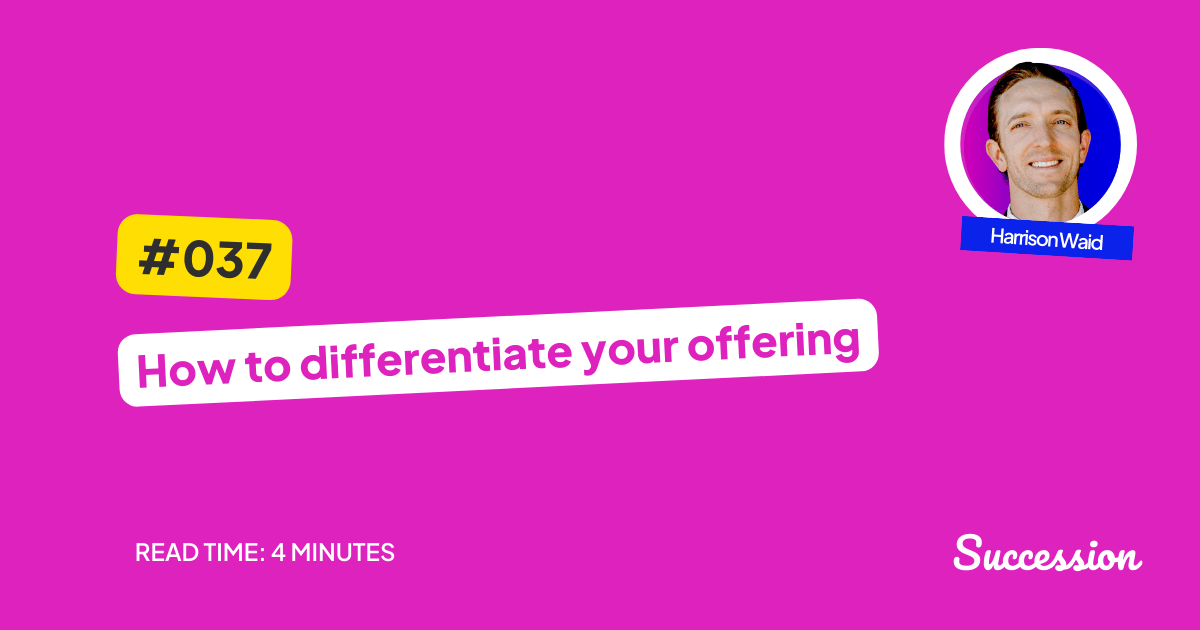Read time: 5 minutes
Welcome to the Succession newsletter where 400+ life science sales reps improve their skills in 5 minutes per week. If you’re getting value from these newsletters, we'd love it if you could forward it along to your sales colleagues. If you’re new here, subscribe below.

Have you ever been in a situation where the customer asks for a last-minute discount and tells you how similar you are to the competition? Maybe they even threaten to go with the competitor instead?
You’re not in sales if this hasn’t happened to you.
It’s a tough situation to be in when you haven’t been able to successfully show the differentiated outcomes you can provide.
What do I mean by differentiated outcomes?
These are the outcomes or results your customer will achieve by using your solution over any other on the market.
If they perceive that they can achieve their desired outcome with any of the potential solutions that exist, then you’re stuck in the commodity battle.
This is where you end up in RFPs (requests for proposals) and feature comparisons, and you ultimately get beaten down on price.
Given the number of alternative solutions and vendors in the market, it’s necessary to embed your differentiators into every part of your sales process.
Define your differentiators
There are multiple types of differentiators and it’s important to call out the differences.
Unique capabilities: These are things that you do that are unique to you and your company.
Comparative capabilities: Your competitors also do these things, but you do them better.
Holistic capabilities: These are collections of things in your organization that are uniquely different to your company.
Let’s say you’ve listed out all of your differentiated capabilities into these 3 buckets. That’s great! Hopefully, you have a lot of them.
Now say this out loud.
“The customer doesn’t care about any of our capabilities”
They want to solve a problem they have that will help them achieve a desired outcome. How they get there is irrelevant in their mind.
So it’s up to you to show them how your differentiated capabilities will deliver them differentiated outcomes!
Make a table and take your capabilities from earlier and then figure out what the differentiated outcome is. If its the same outcome a customer will get from using another solution, then leave it blank.
That won’t be a capability you want to highlight.
Differentiated Capability | Differentiated Outcome |
|---|---|
Capability 1 | Outcome 1 |
Capability 2 | Outcome 2 |
You may have a ton of differentiators but if they don’t deliver differentiated outcomes, why would your customer ever care? Especially if you’re more expensive!
Defend your differentiators
Now you need to defend those differentiated outcomes. You need to show them specifically why that outcome is better than the alternative outcome they would receive from using a different method.
If your unique differentiator delivers a differentiated outcome, tell them why your company took that unique approach to solve the problem (over alternatives) and then back it up with data to show how that differentiated outcome is more beneficial.
If your comparative differentiator delivers a differentiated outcome, you need to show why your “better” capability is able to deliver a different outcome. You can and should use stories from customers to back up these claims.
If your holistic differentiators deliver a differentiated outcome, you need to show how the combination of different capabilities will help them achieve their desired outcome. These are often used to de-risk the decision by highlighting other capabilities your company provides that will ensure they hit their objectives.
While data is a critical component to backing up your differentiators, I highly recommend creating a mini-story or case study for each one of them. Stories are a better way to deliver your message and have it be remembered by your customers.
Embed your differentiators
You want to consistently hit on all your differentiated capabilities that deliver unique value. They need to be a part of each step of your sales process.
Read this previous newsletter for additional strategies for winning competitive deals and influencing the decision criteria.
In each situation below, you’ll be discussing how the capability delivers the differentiated outcome.
Prospecting: Highlight unique capabilities (you need to stand out)
Discovery: Highlight unique and comparative capabilities (differentiate early and often)
Follow-up: Remind them of your unique capabilities and how they are required to hit their objectives (2-slide template)
Solution presentation: Highlight unique and comparative capabilities (show them how those capabilities will deliver their outcomes)
Late-stage discussions: Introduce holistic capabilities to give them confidence that they are choosing the right vendor
Negotiation: Consistently remind them that your differentiators are now required to meet their objectives
Conclusion
Categorize your differentiators and the outcomes they provide your customers
Only focus on the capabilities that provide a differentiated outcome
Use stories and data to defend your claims
Embed those stories and data into your entire sales process


Episode 28: [Leadership] Strategic and solution selling for complex deals with Kinga Bercsenyi
CROs are becoming more strategic
Solution selling complex deals
AI in drug discovery
How to use tactical listening


Special Offer: If you’ve made it this far, you can use the coupon code NEWSLETTER to get 20% off an individual Succession membership.
Recommended Products & Tools: We’ve used every one of these products and can highly recommend them to you. Everything from CRMs to AI tools.
20-Day Prospecting Challenge: This is a daily prospecting challenge to help find more opportunities and exceed your quota. One email. One action. Every day for 20 days. Ready to take the challenge?
Join SAMPS: A free community of sales and marketing professionals of the sciences. They run in-person events and put on regular webinars packed with great content.
Give us feedback: If you love the content we’re putting out, could you do us a favor and take 28 seconds to write us a short testimonial? Or let us know how we can improve.


Succession for Reps: A skill development platform for life science sales reps who want to improve their sales skills, exceed their quota, and take the next step in their career.
Succession for Teams: If you’re a sales leader who’s frustrated with reps living in reactive mode and either not proactively generating new opportunities or letting prospects go dark, reach out to learn more about our team plans.
AI-Powered Prospecting: We’ll build you an AI-powered prospecting machine to book qualified sales meetings with biotech and pharma companies.
Strategy Call: Need more than training? Want help implementing and executing your sales strategy? In a 30-minute call, we will assess your company’s current situation and identify growth opportunities.


